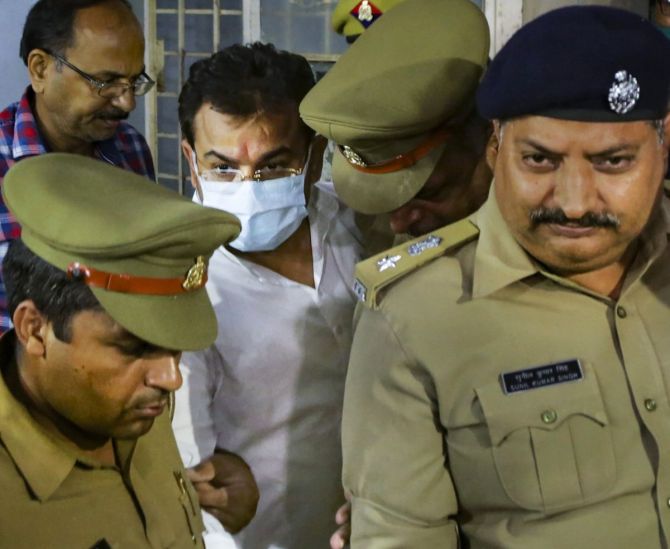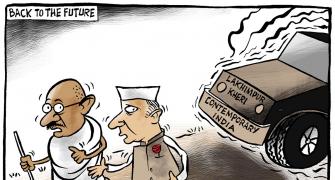The Supreme Court on Monday cancelled the bail granted to Union minister Ajay Mishra's son Ashish Mishra in the Lakhimpur Kheri violence case and asked him to surrender in a week, observing the Allahabad high court had shown "tearing hurry" in giving relief and adopted a ”myopic view of the evidence".

The top court also said the 'victims' were denied ”a fair and effective hearing” in the high court, noting that a 'victim' has unbridled participatory rights from the stage of investigation till the culmination of the proceedings in an appeal or revision.
Holding that the high court order cannot be sustained and deserved to be set aside, the top court termed the Lakhimpur Kheri incident, if true as per allegations, as "an awakening call" to the state authorities to reinforce adequate protection for the life, liberty, and properties of the eye/injured witnesses, as well as for the families of the deceased.
While the Congress attacked the government after the verdict and asked when will Prime Minister Narendra Modi sack Ajay Mishra, the Union Minister of State for Home, the Bharatiya Kisan Union leader Rakesh Tikait said the court decision has given hope of justice to farmers.
On October 3 last year, eight people were killed in Lakhimpur Kheri during the violence that erupted when farmers were protesting against Uttar Pradesh Deputy Chief Minister Keshav Prasad Maurya's visit to the area.
Four farmers were mowed down by an SUV, in which Ashish Mishra was seated, according to the UP Police FIR. Following the incident, the driver and two BJP workers were allegedly lynched by angry farmers.
A journalist also died in the violence that had triggered outrage among opposition parties and farmer groups agitating over the Centre's now-repealed agricultural reform laws ahead of the Assembly polls in Uttar Pradesh and four other states.
Family members of the deceased farmers had challenged the February 10 order of a single-judge bench of the high court giving bail to Ashish Mishra, who had spent four months in custody. Ashish Mishra is the main accused in the case,
The top court dealt in detail with the rights of victims in criminal cases and said they are ”totally independent, incomparable, and are not accessory or auxiliary to those of the State” under the Code of Criminal Procedure (CrPC).
”We are, thus, of the view that this court on account of the factors like (i) irrelevant considerations having impacted the impugned order granting bail; (ii) the high court exceeding its jurisdiction by touching upon the merits of the case; (iii) denial of victims' right to participate in the proceedings; and (iv) the tearing hurry shown by the high court in entertaining or granting bail to the respondent/accused; can rightfully cancel the bail, without depriving the respondent-accused (Mishra) of his legitimate right to seek enlargement on bail on relevant considerations,” said a bench of Chief Justice N V Ramana and justices Surya Kant and Hima Kohli.
Writing the 24-page judgment, Justice Surya Kant asked the high court to decide the bail plea of the accused within a period of three months and held the presence of State' in the bail proceedings ”does not tantamount to according a hearing to a 'victim' of the crime”.
It took note of the submissions of victims that they were not heard in the high court as the video connection of their lawyer was lost and said, ”we are constrained to express our disappointment with the manner in which the high court failed to acknowledge the right of the victims.”
The verdict considered questions including whether a 'victim', as defined in the CrPC, is entitled to be heard at the stage of adjudication of bail application of an accused.
It also dealt with the issue whether high court overlooked relevant considerations while granting bail to Mishra and if so, should the apex court interfere.
Analysing the submissions, the court said until recently, criminal law had been viewed on a dimensional plane in which courts were required to adjudicate between the accused and the State and the 'victim' had no participation in adjudicatory process and "was made to sit outside the Court as a mute spectator".
The verdict then noted the evolution in law and said, "a 'victim' within the meaning of CrPC cannot be asked to await the commencement of trial for asserting his/her right to participate in the proceedings. "The victim has a legally vested right to be heard at every step post the occurrence of an offence."
On the first issue, it answered in the affirmative, and held that in the present case, the 'victims' have been denied a fair and effective hearing at the time of granting bail to the accused.
"It cannot be gainsaid that the right of a victim under the amended CrPC are substantive, enforceable, and are another facet of human rights. The victim's right, therefore, cannot be termed or construed restrictively like a brutum fulmen (empty threat)," it said, adding such rights are "totally independent" of the State.
The verdict said that while deciding the bail plea, a court "should refrain from evaluating or undertaking a detailed assessment of evidence, as the same is not a relevant consideration at the threshold stage."
A court may examine prima facie issues, including any reasonable grounds whether the accused committed an offence or the severity of the offence itself, an extensive consideration of merits which has the potential to prejudice either the case of the prosecution or the defence, is undesirable, it added.
"Instead of looking into aspects such as the nature and gravity of the offence; severity of the punishment in the event of conviction; circumstances which are peculiar to the accused or victims; likelihood of the accused fleeing; likelihood of tampering with the evidence and witnesses and the impact that his release may have on the trial and the society at large; the high court has adopted a myopic view of the evidence on the record and proceeded to decide the case on merits."
The high court had granted bail to Mishra after taking note of the submissions including that the FIR, which alleged fire arm injuries caused by the accused, was not corroborated by the forensic evidence and the post-mortem report.
"The high court has taken into account several irrelevant considerations, whilst simultaneously ignoring judicial precedents and established parameters for grant of bail. It has been ruled on numerous occasions that a FIR cannot be treated as an encyclopaedia of events...," the top court said.
While allegations in the FIR that the accused used his firearm and the subsequent post mortem and injury reports may have some limited bearing, there was no legal necessity to give undue weightage to the same, it said, adding that observations of high court may have bearings on the trial.
It referred to the court's job to ensure that neither the right of an accused to seek bail pending trial is expropriated, nor the 'victim' or the State are denuded of their right to oppose such a prayer.
The top court then remanded the bail plea of the accused for fresh consideration "in a fair, impartial and dispassionate manner, and keeping in view the settled parameters".










